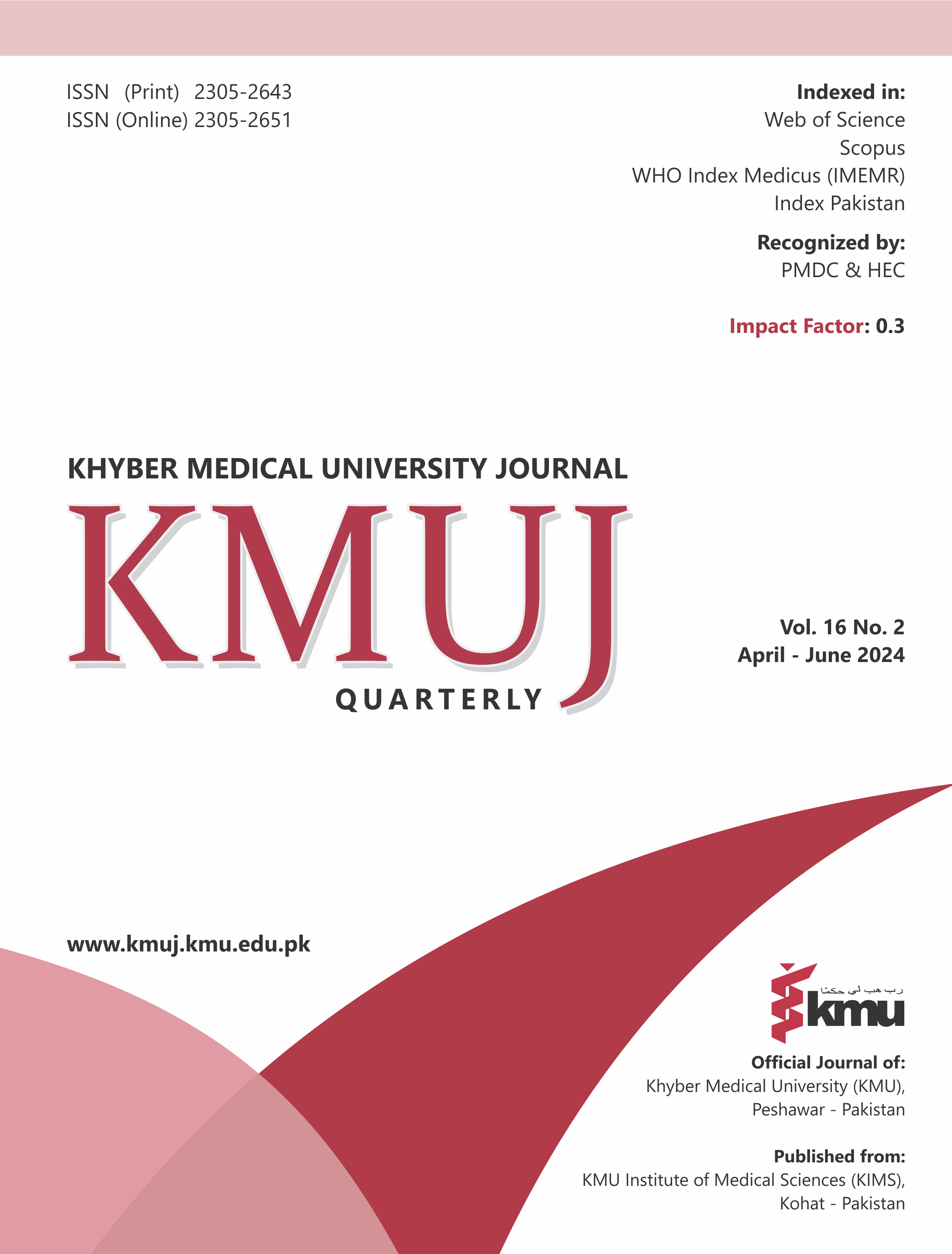Epidermal growth factor receptor immuno-expression in malignant epithelial ovarian tumors
Main Article Content
Abstract
OBJECTIVE: To investigate the expression of epidermal growth factor receptor (EGFR) in surface epithelial ovarian cancers (EOCs) among the local population, considering its potential role as a therapeutic target in ovarian cancer treatment.
METHODS: This cross-sectional study was conducted at Ayub Medical College, Abbottabad, and Khyber Medical University Peshawar, Pakistan, from July 1st to December 31st, 2022. Data from 73 patients diagnosed with EOC were collected using consecutive sampling. Inclusion criteria required histopathological confirmation of EOC and sufficient biopsy specimens for immune-histochemical (IHC) analysis. Patients who declined participation or lacked adequate biopsy samples for IHC were excluded. Biopsy samples were histologically confirmed for EOC, and IHC staining was performed to detect EGFR-1 protein, validated with positive and negative controls.
RESULTS: The mean age of the participants was 53.42±9.99 years, with serous type lesions being the most prevalent (n=40, 54.8%). EGFR expression varied, with 46.6% showing moderate positivity, 27.4% and 19.2% cases demonstrating weak and strong positivity respectively. Significant differences in EGFR positivity were noted between lesion types (p=0.002) and among patients with positive vs. negative family histories (p=0.001). No significant associations were found with parity or socioeconomic status. ANOVA analysis revealed no significant differences in age, age at menarche, or age at menopause based on EGFR positivity levels (p > 0.05).
CONCLUSIONS: A moderate to high intensity level of EGFR expression in cases of serous cyst adenocarcinomas and patients with family history of reproductive system malignancy suggest its potential as a therapeutic target for ovarian cancer treatment in such patients.
Article Details

This work is licensed under a Creative Commons Attribution 4.0 International License.
Work published in KMUJ is licensed under a
Creative Commons Attribution 4.0 License
Authors are permitted and encouraged to post their work online (e.g., in institutional repositories or on their website) prior to and during the submission process, as it can lead to productive exchanges, as well as earlier and greater citation of published work.
(e.g., in institutional repositories or on their website) prior to and during the submission process, as it can lead to productive exchanges, as well as earlier and greater citation of published work.
References
Sung H, Ferlay J, Siegel RL, Laversanne M, Soerjomataram I, Jemal A, Bray F. Global cancer statistics 2020: GLOBOCAN estimates of incidence and mortality worldwide for 36 cancers in 185 countries. CA Cancer J Clin 2021;71(3):209-49. https://doi.org/10.3322/caac.21660
Momenimovahed Z, Tiznobaik A, Taheri S, Salehiniya H. Ovarian cancer in the world: epidemiology and risk factors. Int J Womens Health 2019;11:287. https://doi.org/10.2147/IJWH.S197604
Jessmon P, Boulanger T, Zhou W, Patwardhan P. Epidemiology and treatment patterns of epithelial ovarian cancer. Expert Rev Anticancer Ther 2017;17(5):427-37. https://doi.org/10.1080/14737140.2017.1299575
Cheema MK, Nadeem A, Khan SA, Sarfraz T, Intikhab K, Shahzad T. Evaluation of histo-pathological patterns of ovarian masses in relation to age in Rawalpindi-Islamabad region - Lab Research. J Pak Med Assoc 2019;69(2):285-9.
Global Health Estimates: Leading Causes of Death [Internet]. World Health Organization. World Health Organization; [Accessed On: January 26, 2023]. Available from URL: https://www.who.int/data/gho/data/themes/mortality-and-global-health-estimates/ghe-leading-causes-of-death
Coburn SB, Bray F, Sherman ME, Trabert B. International patterns and trends in ovarian cancer incidence, overall and by histologic subtype. Int J Cancer 2017;140(11):2451-60. https://doi.org/10.1002/ijc.30676
Kumar V, Abbas AK, Fausto N, Aster JC. Robbins and Cotran Pathologic Basis of disease. 10th ed. Philadelphia: Elsevier Saunders; 2018.
Harrison PT, Vyse S, Huang PH. Rare epidermal growth factor receptor (EGFR) mutations in non-small cell lung cancer. Semin Cancer Biol 2020;61:167-79. https://doi.org/10.1016/j.semcancer.2019.09.015
Sharifi J, Khirehgesh MR, Safari F, Akbari B. EGFR and anti-EGFR nanobodies: review and update. J Drug Target 2021;29(4):387-402. https://doi.org/10.1080/1061186X.2020.1853756
Asante DB, Calapre L, Ziman M, Meniawy TM, Gray ES. Liquid biopsy in ovarian cancer using circulating tumor DNA and cells: ready for prime time? Cancer Lett 2020;468:59-71. https://doi.org/10.1016/j.canlet.2019.10.014
Yu J, Kane S, Wu J, Benedettini E, Li D, Reeves C, et al. Mutation-specific antibodies for the detection of EGFR mutations in non-small-cell lung cancer. Clin Cancer Res 2009;15(9):3023-8. https://doi.org/10.1158/1078-0432.CCR-08-2739
Wen YH, Brogi E, Hasanovic A, Ladanyi M, Soslow RA, Chitale D, et al. Immunohistochemical staining with EGFR mutation-specific antibodies: high specificity as a diagnostic marker for lung adenocarcinoma. Mod Pathol 2013;26(9):1197-1203. https://doi.org/10.1038/modpathol.2013.53
Cirstea AE, Stepan AE, Zavoi RE, Simionescu CE. EGFR immunoexpression in malignant serous and mucinous ovarian tumors. Curr Health Sci J 2018;44(2):129. https://doi.org/10.12865/CHSJ.44.02.06
Brustmann H. Epidermal growth factor receptor expression in serous ovarian carcinoma: an immunohistochemical study with galectin-3 and cyclin D1 and outcome. Int J Gynecol Pathol 2008;27(3):380-9. https://doi.org/10.1097/PGP.0b013e31815d060d
Chen AP, Zhang J, Liu H, Zhao SP, Dai SZ, Sun XL. [Association of EGFR expression with angiogenesis and chemoresistance in ovarian carcinoma]. Zhonghua Zhong liu za zhi [Chinese Journal of Oncology]. 2009;31(1):48-52.
Fujiwara S, Terai Y, Kawaguchi H, Takai M, Yoo S, Tanaka T, et al. GPR30 regulates the EGFR-Akt cascade and predicts lower survival in patients with ovarian cancer. J Ovarian Res 2012;5(1):35. https://doi.org/10.1186/1757-2215-5-35.
Skirnisdóttir I, Sorbe B, Seidal T. The growth factor receptors HER-2/neu and EGFR, their relationship, and their effects on the prognosis in early stage (FIGO I-II) epithelial ovarian carcinoma. Int J Gynecol Cancer 2001;11(2). https://doi.org/10.1136/ijgc-00009577-200103000-00005
Nielsen JS, Jakobsen E, Hølund B, Bertelsen K, Jakobsen A. Prognostic significance of p53, Her-2, and EGFR overexpression in borderline and epithelial ovarian cancer. Int J Gynecol Cancer 2004;14(6). https://doi.org/10.1136/ijgc-00009577-200411000-00005
Marinaş MC, Mogoş G, Ciurea R, Mogoş DG. EGFR, HER2/neu, and Ki67 immunoexpression in serous ovarian tumors. Rom J Morphol Embryol 2012;53(3):563-7.
Braem MG, Onland-Moret NC, Van Den Brandt PA, Goldbohm RA, Peeters PH, Kruitwagen RF, et al. Reproductive and hormonal factors in association with ovarian cancer in the Netherlands cohort study. Am J Epidemiol 2010;172(10):1181-9. https://doi.org/10.1093/aje/kwq264
